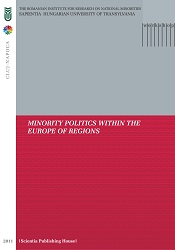Territorial Autonomy of the Gagauz in the Republic of Moldova: a Case Study
Territorial Autonomy of the Gagauz in the Republic of Moldova: a Case Study
Author(s): Andrei Avram
Subject(s): Politics / Political Sciences
Published by: Scientia Kiadó
Keywords: Gagauz Republic; Moldova; territorial autonomy; Transnistria;
Summary/Abstract: In December 1994, the Parliament of the Republic of Moldova passed the Law on the Special Judicial Status of the Gagauz Yeri, formally ending a stand-off between the central government and the self-declared Gagauz Republic in the south of the country. The Gagauz were granted territorial autonomy covering almost the entire spectrum of domestic policy areas and were provided with a regional legislature and executive body. This peaceful solution was hailed as a “spectacular victory of reason” (Troebst 2001: 76), given the fact that the Republic of Moldova was engaged in a further conflict in the breakaway region of Transnistria. However, the effectiveness of an autonomy model primarily depends on its subsequent implementation and the consequences it has for the state as a whole (Protsyk/Rigamonti 2007:1). The aim of the present paper is to shed light on the success of Gagauz territorial autonomy by analysing its capacity to enhance Gagauz identity, as well as the extent to which it can be considered a (de-)stabilising factor for the Republic of Moldova. The first criterion appears to be relevant in the Gagauz context because the legitimacy of an ethnically-based territorial autonomy is related to the right of a national minority to pursue its own nation-building at sub-state level (Kymlicka 2001), whereas political elites in the region have been accused of being more intent on maintaining Soviet identity than promoting Gagauz nationhood (Nantoi 2009: 6). The second criterion involves examining if the territorialisation of Gagauz collective rights resulted in an increased secessionist potential. This risk has been voiced for all new democracies in Eastern Europe (Hughes/Sasse 2002: 9) and it has periodically been invoked by Moldovan analysts due to the Gagauz’ co-operation with Transnistrian authorities (Praporşcic 2008) and their demands for a federalisation of the Moldovan state (Gherasim 2010). At the same time, territorial autonomy is also viewed as having the potential of strengthening weak states with a multiethnic population (Kolstø 2001: 214) – a hypothesis that needs to be considered, especially since Gagauz experts underline the wish of their people to contribute to the unity of the country (Angheli 2009).
Book: MINORITY POLITICS WITHIN THE EUROPE OF REGIONS
- Page Range: 211-236
- Page Count: 26
- Publication Year: 2011
- Language: English
- Content File-PDF

